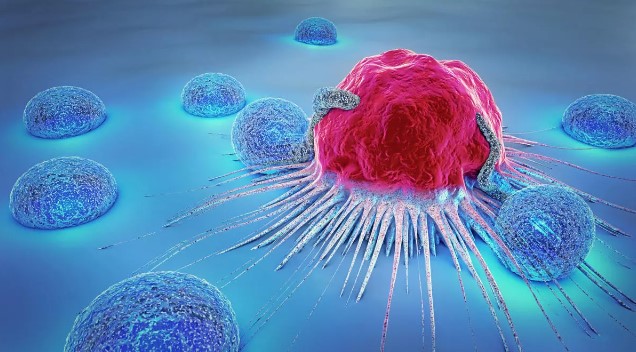A recent study conducted by researchers at the Sylvester Comprehensive Cancer Center at the University of Miami Miller School of Medicine suggests that CAR-T immunotherapy remains a viable treatment option for lymphoma patients who have achieved remission before undergoing cell therapy.
Although the study does not definitively answer whether cell therapy should be administered to patients in remission, it does indicate that it is a safe and reasonable strategy for these individuals. “I don’t think it answers the question of: Should we give these patients cell therapy? But I think it answers the question that we can—that it’s safe and that it’s a reasonable strategy when you’re in that spot,” said Trent Wang, D.O., a hematologist and cellular therapy specialist at Sylvester Comprehensive Cancer Center.
Cell therapy, a type of immunotherapy that utilizes engineered immune cells to target and attack cancer cells, is often the last resort for many patients, following the failure of other treatment options. However, Wang observed an interesting occurrence in recent years while treating lymphoma patients with this therapy – some patients achieved complete remission before actually receiving the cell therapy.
This unique scenario arises during the process of preparing for cell therapy, which in the case of Wang’s study involves the use of engineered immune cells called CAR-T cells. There is a waiting period of three to five weeks before patients can proceed with the treatment, during which time insurance approval is obtained, and the cells are manufactured from the patient’s own cells. In many cases, patients are seriously ill with their cancer, so doctors may administer a short course of chemotherapy or other drugs to alleviate symptoms.
In a small number of cases, some patients achieved remission during this waiting period treatment. This presented a dilemma for doctors – should they alter the treatment plan or proceed with the therapy as scheduled? Wang explained, “Now what are we supposed to do? Should we change the plan or give the therapy anyway? We just didn’t have a lot of information on this scenario.”
In most instances, Wang’s team decided to continue with the cell therapy in patients who achieved remission, primarily to prevent the potential recurrence of cancer during the waiting period. However, these decisions were made without substantial evidence to support the approach.
To address this knowledge gap, Wang and his colleagues proposed a research study to the Center for International Blood & Marrow Transplant Research, a national registry that tracks patients who have undergone cell therapies or transplants. The study analyzed data from 134 patients who had achieved complete remission during the waiting period before receiving CAR-T cell therapy. This group was identified from a pool of over 5,000 cell therapy patients included in the registry.
The results showed that patients in remission had a 43% probability of progression-free survival over the two years following treatment, which was comparable to patients who underwent CAR-T therapy without prior remission. Furthermore, patients in remission experienced significantly fewer toxicities associated with cell therapy, specifically cytokine release syndrome and neurotoxicity – both of which are potential side effects of CAR-T cell therapy.
It is important to note that the study used data from patients treated with CAR-T cell therapy between 2015 and 2021, and the current frequency of cell therapy utilization may differ slightly from previous years. Moving forward, the researchers aim to analyze data reflecting more recent treatment trends.
In conclusion, this study provides evidence supporting the safety and efficacy of CAR-T cell therapy in lymphoma patients who achieve remission prior to treatment initiation. While further research is needed to fully understand the implications of this finding, it offers valuable insights for clinicians making treatment decisions for these individuals.



